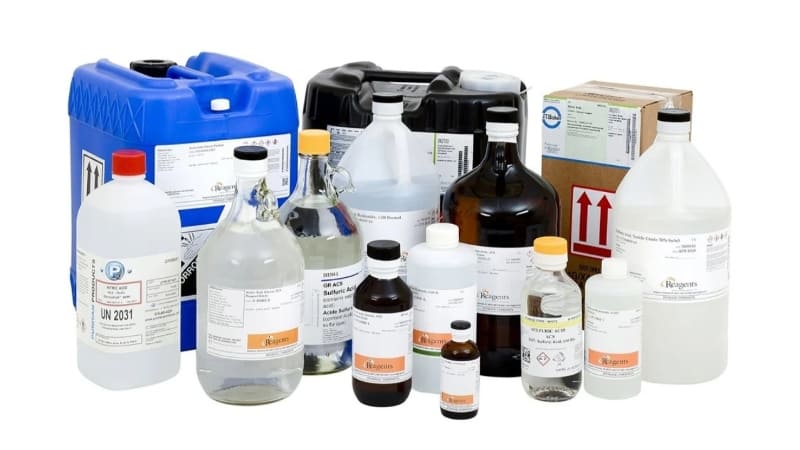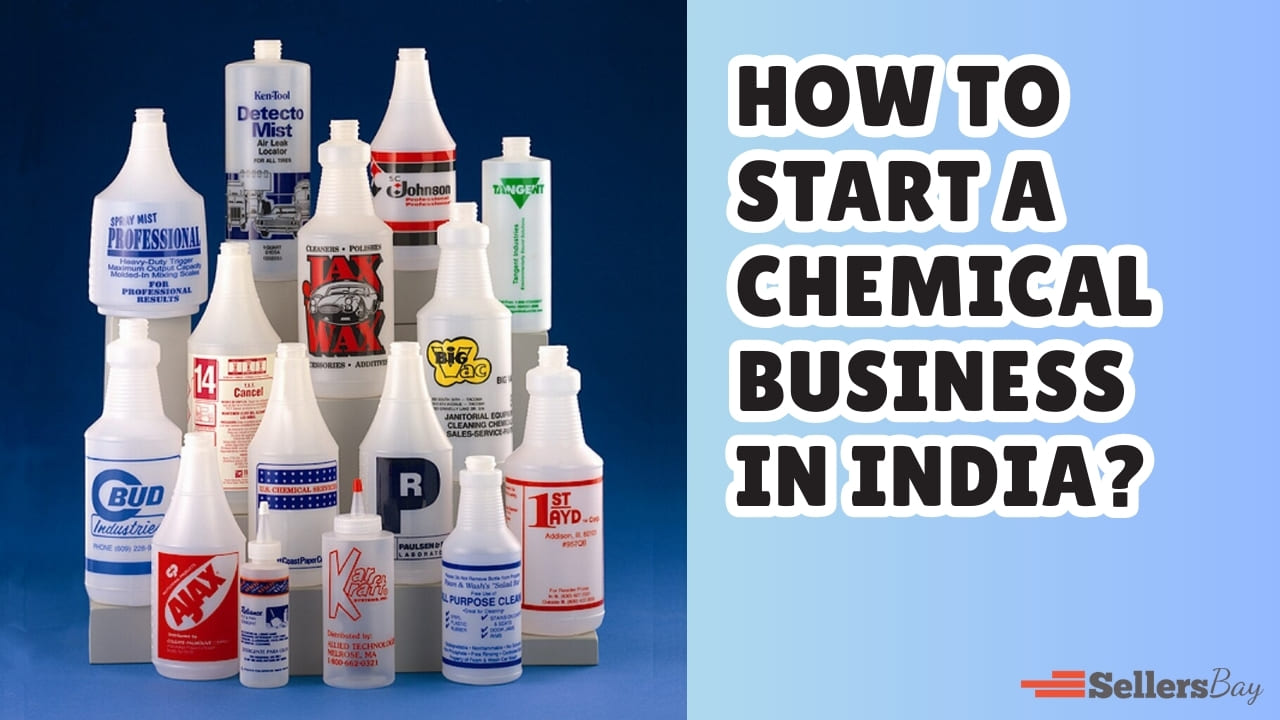Overview of Chemical Business Opportunities in India | Business opportunities in Chemical industry
India’s chemical industry has the potential to grow massively, which can entail many business prospects for investors both in the country and internationally. Currently, the value of the market stands at around INR 14.5 lakh crore (which is USD 178 billion), and this is expected to reach INR 24.5 lakh crore (which is an estimated USD 304 billion) by the year 2025, representing a compound annual growth rate (CAGR) of around 9.3%. The rise in the Indian chemical market within that time period can largely be attributed to the elevated market demand across a number of sectors such as textiles, pharmaceuticals, and agro chemical industries complemented by helpful policies that invite foreign direct investments and promote infrastructural growth.
According to India’s vision of being an international manufacturing source, the chemical industry is very important in this regard providing restoration on costs through low employment pay and open access to markets. The changing scenario gives us the impression that it is the right time for the stakeholders to dive into the various possibilities that this rapidly growing industry has to offer.
How to start a Chemical business in India?
Would you argue that investing in a chemical business in India is a good idea? Maybe. But before deciding on a chemical business it is important to do one’s due diligence for example conducting a market research, identifying the potential of the specific chemical product and the demand within the industry and business in general. So, with that together amongst other tasks, we can get into the meat.

Different steps involved in starting a Chemical business:
1. Start Your Market Research
It’s always an advantage to have an early start, so, do your best to conduct a market research as it has a lot of positive outcomes. ensure to answer questions such as: do I need to create a business in agriculture, pharmaceuticals, or chemical manufacturing? how many competitors are the in the areas of the chemical business I want to work in and what are their strengths? All these questions amongst others are necessary to have a proper insight as to what the market, in general qualitative and quantitative, looks like.
2. Identify the Product
Starting a business with a strong background in chemical production can help you understand your market’s needs. Once you have identified your key demographics and researched competitors, this information can be of use when determining which chemicals to manufacture or sell. It is advisable to focus on the production of a chemical which has a high demand and is fairly profitable, such as detergents or other specialty chemicals used in agriculture.
3. Create a Business Plan
A good business plan can offer insights into your business goals and strategies and provides forecasts about finances. It additionally serves as a comprehensive outline of how an organization intends to run operations including borrowing money or attracting potential investors. When crafting such a plan, make sure to include critical details about marketing strategies and plans concerning your target market.
4. Apply for the Right Permits and Licenses
When one wants to start the manufacturing or production of chemicals in India, one must be aware that obtaining a number of licenses and permits is mandatory while setting up a business in this sector. You will need to obtain:
- An industrial license.
- A factory license.
- Consent to Establish (CTE) and Consent to Operate (CTO) from the pollution control board..
- Other specific licenses depending on the chemicals you plan to handle.
Finally, ensure that you follow rules such as the Manufacture, Storage and Import of Hazardous Chemicals Rules.
5. Register your Business
It is mandatory to register your chemical business with the Registrar of Companies (ROC) in each state Many details need to be covered in this step inclusive of selecting a business form which can be sole proprietorship, partnership or private limited companies along with putting forth necessary proofs concerning identity and address of the promoters.
6. Choose a Suitable Location for Manufacturing Facility
The selection of a proper site for the establishment of manufacturing facility is very crucial. Where possible, look at the location of potential suppliers, transportation systems and zoning requirements. Also, remember that the facility must comply with safety requirements for the chemicals handling.
7. Buy Equipment and Raw Materials
Need to buy the necessary machines for manufacturing depending with your product. The equipment can be brand new, or just second-hand depending on your pocket. Set trustworthy suppliers of raw materials that will be used for the manufacture as well.
8. Employ Qualified Personnel
Hire well trained people that can run production processes. Depending with the size of your business, you might look at hiring chemists, operators, quality control, and admin staff as well.
9. Develop Marketing Tactics
After your set up has been done, and you are geared up for production, it will be best to devise a marketing plan in order to find prospective clients. Use the internet, marketing events, and industry contacts to best market your products.
10. Protect yourself from Legal Action
Last but not least, make sure to always protect your employees, by teaching them how to correctly use chemicals while preventing accidents, and how to sufficiently respect safety regulations. Do not forget to periodically check environmental legislative compliance to prevent problems in the future.
By following these steps thoroughly, you will be able to form a chemical business in India as per the rules and regulations and the market requirements as well.
Chemical business license for starting a Chemical Business
Gaining the necessary licenses or permits is one of the most important factors for adherence and compliance in the industry. In an effort to help prospective entrepreneurs, below are key licenses required to set up a chemical business in India:
- Trade License: A trade license is required for all chemical related businesses and is granted by the municipal authority. In order to obtain this license, there are several documents that need to be included such as proof of residence and identification.
- Factory License: Factory License is a mandatory requirement under the Factories Act of regulations, which ensures certain sanitary and safety norms have been maintained within the manufacturing unit. This is issued by the Chief Inspector of the Labour Commissioner Organisation after conduction of an inspection.
- Consent to Establish (CTE): CTE is obtained from State Pollution control board prior to the setup of manufacturing plant and enables businesses to set up factories while adhering to the compliance standards.
- Consent to Operate (CTO): Post the plant setup, one would require a CTO for business operations to begin. In this stage, businesses are required to provide necessary documentation that proves sustainability regulations are being followed.
- Hazardous Waste Authorization: This authorization is often required for almost every business involving hazardous materials, for achieving authorization one needs to apply using form 1.
- BIS Registration: To meet the Indian standard, registration with the Bureau of Indian Standards (BIS) is required for certain chemicals. This includes the certification for the registration offer that involves the testing of the products in the BIS approved laboratories.
- Import Export Code (IEC): Businesses related to international trade in imports and exports have to get an IEC from the Director General of Foreign Trade in order to bring in or send out chemicals.
- Fire No Objection Certificate (NOC): A fire NOC is needed to confirm that manufacturing facilities are safe and it is taken from local fire services after free inspection.
- MSME Registration: Where applicable, registration as Micro, Small and Medium Enterprise (MSME) may offer many advantages and benefits from the government.
These licensing requirements can be quite intricate and it would be best for those entrepreneurs in the chemical line to get professional help in order to ensure that these legal requirements are properly and effectively fulfilled.
Documents required for obtaining a chemical business license
In India, different types of licenses come with definite requirements as such, obtaining a chemical business license has certain prerequisites or requirements such as the following:

List of documents for starting a Chemical Business
1. Application Form:
- For a particular chemical license, complete application forms should encompass appropriate documentation. Such application forms include Form No. 19, Form No. 19A, Form No. 19B, and Form No. 19C.
2. Proof of Business Constitution:
- Companies must abide by law such that a Memorandum and articles of association need to be provided.
- In cases where there is a partnership firm, a partnership deed is required alongside the notarized documents from a Notary Public.
- In cases where trusts are concerned, an official or the Trust Deed should be provided.
3. Identification Documents:
- Photo ID proof of the proprietor, partner, or director of the firm.
4. Affidavits:
- An affidavit regarding non conviction under The Drugs And Cosmetic Act, 1940 should be provided.
- An affidavit regarding the compliance with the local development plans should be presented.
5. Site and Key Plans:
- An appropriate Site Plan and key Plan detailing the locality of the premises where the undertaking will be carried out should be included.
6. Proof of Premises:
- If the facility is rented, then any Rental Agreement and Rent Receipt should be included.
- In the case where the property is owned, then copies of registered General Power of Attorney, Sale Deed, OR Property Tax Receipt should be included.
7. List of Equipment and Staff:
- List of machinery and equipment used for manufacturing.
- List of technical staff along with their educational qualifications and experience certificates.
8. Product Information:
- Complete details of each product formulation intended for production along with product safety information for each constituent chemical.
9. Environmental Compliance Documents:
- There are certain documents issued by the authorities that encourage business establishment, such as Consent to Establish (CTE) given by the State Pollution Control Board (SPCB) or Pollution Control Committee (PCC).
- The Consent to operate (CTO) is issued at the commencement of operations of the facility after the SPCB/PCC has conducted inspections.
10. Fire Safety Documents:
- Details on the fire safety certification from the relevant authorities, including Fire No Objection Certificates (NOC) from the local fire authority.
11. Payment Receipts:
- Documents attesting to the online payment of application fees for processing international applications.
12. Additional Certificates:
- Import Export Code (IEC) if involved in international trade.
- BIS registration if required for specific chemicals.
These documents are necessary to assist in licensing and operating a firm within the chemical sector and observing compliance with all industrial standards.
Different modes of doing Chemical Business
1] Chemical Import Export business | Chemical export business
The chemical import-export business includes importing and exporting a wide variety of chemical goods throughout the world’s markets. In India, this sector has a key importance in the economy. It ranks among the world’s top countries in terms of chemical goods’ exports. For example, according to FY 2022-23 figures, India’s chemical exports constituted more than worth USD 30 billion, exporting large amounts of organic and inorganic chemicals, agro-chemicals, plastic resins and the like to the USA, Brazil, China, etc.
2] Chemical Trading business
Chemical trading is the trade in chemicals, which includes buying and selling chemicals or chemical substances, however, it is not a prerequisite to the production of chemicals. Traders are in between producers and end-users. This kind of business model is quite common in India because of the different types of chemicals manufactured in the country.
For example, MG Organics and Sandhya Organic Chemicals are companies that deal with the trading of numerous organic and inorganic chemicals to different countries of the world. The ramifications of the trading business always affix diverse types of supply chains and ease the problems of accessing raw materials by manufacturers as well as availing customers with a variety of raw materials.
3] Chemical Distribution business | Chemical Supply business
Managing the logistics and supply chain industry where chemical goods are transported from the manufacturer to the user is referred to as the chemical distribution business. Various types of industries require, and thus, use chemicals, so distributors play an essential role in this business. Meru Chem Pvt. Ltd., for instance, is an Indian Company that focuses on distributing specialty chemicals and raw materials for pharmaceuticals and agriculture. This type of business model is crucial for proper inventory handling, legal compliance, and software support for the customers.
4] A Contract Manufacturing Service
Contract manufacturing in the chemical industry means engaging other companies to carry out some of the production processes of goods for them. Companies are able to internationalize their activities by seeking foreign production assistance and constitute barriers to heavy investments into local manufacture.
In India, many firms utilize contract manufacturing for chemicals, for instance, a specific formulation is provided to a contract manufacturer and then it is manufactured in bulk. This is especially true for those companies that intend to increase the number of products in the same line as soon as possible while sticking to their quality control and up to standard.
All these modes of doing chemical business add up to the India’s robust chemical industry by promoting development and innovativeness as well as satisfying local and international markets.
How to start a Chemical Supply business?
According to various experts and specialists, starting a business in chemical supply can be very fruitful if done correctly. This takes a few steps to complete, and here is a short overview:
1. Market Research
The very first thing you need to do is assess the availability of a particular chemical in a target market. Establish specific buyers like laboratories, manufacturers, and educational institutions, among others, to determine what market segment they serve.
2. Make A Business Plan
Draft a business plan detailing your business goals, target demographic, products you intend to offer, their pricing, and estimated earnings from the business. Having these details would be beneficial in successfully carrying out your business activities.
3. Check Legal Requirements
Understand the legal requirements needed to start a chemical supply company in India. This includes acquiring the relevant permits, licenses, and certificates from legal bodies to operate for safety and environmental being.
4. Register Your Business
Register the business according to its pre-approved structure such as sole, partnership, or private companies and get the needed licenses for starting operations legally.
5. Form Supplier Networks
Look to partner with prospective chemical suppliers or manufacturers with a good reputation. Ensure to discuss pricing and logistical costs so that supply chain management does not face problems in the future.
6. Set Up Storage Facilities
To set up appropriate storage areas for the chemicals, it is important that all safety regulations required for the storage and handling of chemicals are fully complied with. Appropriate safety labeling and procedures should be emphasized to avoid any accidents.
7. Develop Distribution Logistics
Develop efficient distribution mechanisms for the chemicals in order to reach the customers On Time. You may want to build some of the transportation resources or collaborate with transport service providers to meet delivery schedules.
8. Market Your Business
In order to expand your chemical supply business, implement suitable advertising policies. Building up on social marketing or attending trade fairs and networking for business development in the industry would be useful.
In summary, the outlined steps will allow you to start and manage a chemical supply business in India within the boundaries of the legislation and in conformity with the needs of the market.
Best Ideas to Start a Successful Chemical Business
Top 10 chemical business ideas
1. Manufacturing Natural and Herbal Cosmetics
Given the trend towards natural cosmetics, so starting a business of making lipstick with all chemical formulations can cater the target market of such people who want real products and environmentally friendly make-up.
2. Cleaning chemical business | Specialty Cleaning Products
By introducing green cleaners or industrial cleaners, one would be able to create and expand a new market by producing and selling specialized cleaning products. As low-cost buying raw materials means high-profit margins.

3. Biofuels from Waste Cooking Oil
Turning waste cooking oil into biodiesels is eco friendly and tax benefit can be claimed in many regions. This approach not only generates profit but also contributes to sustainability efforts by recycling waste material.
4. Agricultural Chemical Production
Manufacturing of fertilizers, insecticides, and any kind of agricultural chemical can be very rewarding, especially with a lot of investment in capital. This is one of the most important sectors in view of modern agriculture.
5. Essential Oils and Perfumes
The making of perfumes and essential oils is art and can be a lucrative business. This venture needs knowledge of distillation processes, but even so, it has a high return if marketed properly.
6. Disinfectant Liquid Manufacturing:
With the increased concentration over hygiene being practiced in households and within the healthcare system, producing disinfectants becomes a lucrative business. The production process is quite simple and only basic machinery is needed.
7. Buying and Selling Chemical Supplies
Buying chemicals in in bulk and selling them in set quantities as for example household chemicals can result in considerable profits. Example: A business model that works well is buying large quantities of acetic acid, then thinning it and marketing it as kitchen cleaning detergent at a very high price.
8. Lubricants with High Level Performance
It can be worthwhile to create specialized lubricants intended either for the industry or for automotive purposes. There is always a demand for high performance lubricants which provide better protection, strength or life. This hub of innovations often yields good profit for the manufacturers who deal with Automotive, manufacturing, aerospace sectors and many more in the providing services of this area.
9. Specialized Water Treatment Chemicals
With the environmental effect gaining importance, the water quality concern has also led to the growth of markets for advanced water treatment chemicals. This comprises of specialty chemicals for the treatment of municipal water supply, industrial waste water treatment, and household water system units. Such domestic and industrial applications contain ultimate importance in ensuring the safety and quality of water which enables businesses providing cost effective solutions for them to charge a hefty price.
10. Petro Chemical Business
In India, the business chemical industry derives plenty of opportunities due to the increasing requirement of plastic, synthetic fibers and other chemical reagents made out of petroleum. Beginning a unit of petrochemical production will enable entrepreneurs to fabricate through various components such as polyethylene, polypropylene and ethylene glycol which serve in primary capacities in a wide range of packaging, textiles, automotive, construction and other industries.
Must Read,
✔️ Rice Mill Business: Starting a Rice Mill in India
✔️ Top 30 Most Profitable Business Ideas in Jammu and Kashmir
Conclusion
Chemicals and Chemical products has growth potential in India and therefore shall provide numerous opportunities for entrepreneurs as well as investors. The Indian market in time is forecasted to grow as the industry is set to become INR 24.5 lakh crore by the year 2025. This will not however come easy as each actor will have to arguably go through the tedious process of establishing a business which includes among others market research, legal compliance and licensing.
To sum up, in order to fully participate in the chemicals sector in India an entity has to invest substantial resources as well as time and endure legal processes. They should focus on securing the required licenses or permits which is their major hurdle while initializing their business plans which should ideally focus on the market demand. Therefore, such ventures will not only be successful in today’s market but will be essential for India establishing itself as the center for global manufacturing of chemicals.







![[50+] Ideas to Repurpose Waste Chemicals into Profitable Products](https://sellersbay.in/wp-content/uploads/2025/01/50-Ideas-to-Repurpose-Waste-Chemicals-into-Profitable-Products.jpg)

